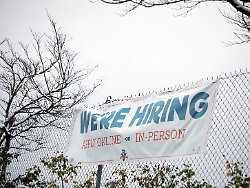Consequences of Brexit and pandemic
Majority of British companies cannot find staff
4/28/2022 9:52 am
Rising prices and the corona pandemic are currently causing problems for most companies. Many British companies are complaining about a shortage of skilled workers due to tightened immigration rules as a result of Brexit. Four out of five companies find it difficult to fill their vacancies.
As a result of Brexit and the corona pandemic, British companies continue to have considerable problems finding skilled workers. According to a survey by the British Chambers of Commerce (BCC), around four fifths (78 percent) of companies have difficulties finding staff. The BCC said that the situation in the hospitality industry, in construction and in logistics was particularly worrying. But basically all sectors are affected – and especially smaller companies. Because of the pandemic, they have lost reserves and are now unable to pay the higher salaries demanded.
“Businesses are finding it harder than ever to fill vacancies and there are no signs of improvement,” said BCC expert Jane Gratton. In an already tight job market, competition is driving up labor costs, leaving many companies unable to hire the workers they need. “Combined with rising prices for energy, transportation, raw materials and other costs, this means a precarious situation for companies,” Gratton said.
She called on the government to take targeted measures to combat the shortage of skilled workers. This includes retraining and special visas to bring workers into the country for sectors that are particularly affected. The government always points to the record number of more than 1.3 million job vacancies to emphasize the country’s economic strength. Economic experts emphasize, however, that the shortage is a consequence of tightened immigration rules – the government imposed high hurdles for work visas after Brexit. This is now preventing the return of foreign professionals who had lost their jobs and left the country during the pandemic.
